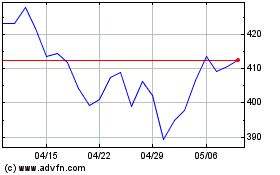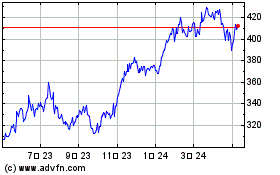(FROM THE WALL STREET JOURNAL 11/23/15)
By E.S. Browning
Corporate stock buybacks are climbing toward a
postfinancial-crisis high this year, furthering the debate about
the use of hundreds of billions of dollars in company cash to
enhance quarterly earnings reports.
Stock repurchases boost earnings per share, even if total
earnings don't change, by reducing the number of shares. Analysts
and investors typically track per-share earnings, not overall
earnings.
Buybacks have drawn criticism from some fund managers including
Larry Fink, chief executive of BlackRock Inc., which oversees $4.5
trillion in assets. He has said some companies invest too much in
buybacks and too little in longer-term business growth. Repurchases
also have become a political issue. Democratic presidential
candidate Hillary Clinton has called for more-frequent and fuller
disclosure of them by the companies involved, even as some activist
investors push for more buybacks as a way of returning cash to
investors.
In the year's first nine months, U.S. companies spent $516.72
billion buying their own shares, with third-quarter reports still
not complete, according to Birinyi Associates. That is the highest
amount for the first three quarters since the record year of 2007,
the year before the financial crisis. It leaves this year on track
for a post-2007 high if fourth-quarter buybacks hold up.
Buybacks can have a significant impact on earnings, as was
illustrated this quarter by companies including Microsoft Corp.,
Wells Fargo & Co., Pfizer Inc. and Express Scripts Holding
Co.
Microsoft turned a decline in total earnings into a per-share
gain by repurchasing a little more than 3% of its shares in the
past 12 months. Its total third-quarter earnings were down 1.3%
from a year earlier, but per-share earnings rose 3.1%, according to
FactSet.
For Wells Fargo, a 0.6% increase in total earnings became a 2.9%
gain in earnings per share after buybacks. At Pfizer, a 2% overall
earnings gain became a 5.3% per-share jump. Express Scripts, a
large drug-benefits manager, turned a 2.8% overall gain into a
12.4% per-share increase.
Apple Inc. is by far the biggest buyback spender this year, with
$30.22 billion, followed by Microsoft, Qualcomm Inc. and American
International Group Inc.
This year isn't on pace to surpass 2007 in total buybacks. But
Birinyi's data show that announcements of planned future buybacks
are the highest for any year's first 10 months, more even than in
2007.
"If companies execute their plans, we are looking at a record
amount being deployed over the next couple of years," said Birinyi
analyst Robert Leiphart.
Some analysts have said for years that the buyback pace will
slow, but there is little sign of that. Nike Inc. on Thursday
announced plans for up to $12 billion in buybacks over the next
four years, following an $8 billion program that ends next May.
With corporate cash levels near records and interest rates low,
use of cash or debt to finance buybacks is becoming widespread.
"More than 20% of all companies in the S&P 500 reduced share
count by at least 4%" over the 12 months through the third quarter,
said Howard Silverblatt, senior index analyst at S&P Dow Jones
Indices. It marked the seventh quarter in a row that at least 20%
of S&P 500 companies reported that kind of share reduction. A
buyback of 4% or more can have a noticeable impact on earnings per
share, Mr. Silverblatt said.
He calculates that about 12% of S&P 500 companies already
have bought so many shares that, even if their total fourth-quarter
earnings don't rise and they buy no more shares, their
fourth-quarter earnings per share will be up at least 4%, due
simply to reduced share count.
Last year, he said, he calculated that S&P 500 companies got
a return of about 1.3% on cash they held, which put pressure on
them to put the money to work.
Buybacks sometimes can push up a company's stock price simply by
boosting demand. Most of the heaviest buyers of their own shares
have seen their stock prices rise this year, with Apple up 8.1% and
Microsoft up 17%. But Qualcomm is down 33% this year, Oracle Corp.
has retreated 12.5% and biotechnology company AbbVie Inc. has
fallen 6.6%.
Some critics have complained that buybacks also can represent a
hidden cost of using stock awards or options as executive pay. When
issuing stock to executives, companies typically buy back shares in
the market to keep share count from rising. They don't typically
announce the buybacks as a compensation cost, analysts say.
Some analysts would like companies to be more forthcoming.
Currently, buybacks permit managers to receive "more of a company's
cash flow than is reported as compensation on the income
statement," said an October study by Research Affiliates, a
research firm and investment-products designer in Newport Beach,
Calif.
Mark Clements, one of the authors of the Research Affiliates
report, noted that managers' pay also sometimes depends on gains in
earnings per share, which can provide a further temptation to
initiate buybacks.
More generally, critics have said that buybacks represent an
artificial, short-term method of boosting profits. Some companies
have made large buybacks in quarters when earnings were soft,
leading to complaints that they were simply managing earnings.
In a letter this year to companies in which BlackRock invests,
Mr. Fink, the CEO, wrote that "more and more corporate leaders" are
taking "actions that can deliver immediate returns to shareholders,
such as buybacks or dividend increases, while underinvesting in
innovation, skilled workforces or essential capital expenditures
necessary to sustain long-term growth."
Access Investor Kit for "Apple, Inc."
Visit
http://www.companyspotlight.com/partner?cp_code=P479&isin=US0378331005
(END) Dow Jones Newswires
November 23, 2015 02:47 ET (07:47 GMT)
Copyright (c) 2015 Dow Jones & Company, Inc.
Microsoft (NASDAQ:MSFT)
過去 株価チャート
から 3 2024 まで 4 2024

Microsoft (NASDAQ:MSFT)
過去 株価チャート
から 4 2023 まで 4 2024
